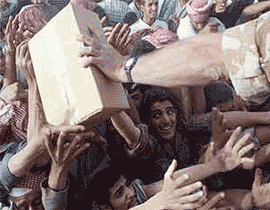Gideon Levy
It’s hard to tell which propaganda is of inferior quality in this war, the American or the Iraqi. Last Thursday, for example, U.S. General Vincent Brooks spoke with reporters at his headquarters in Qatar. He showed photographs of a U.S. Marines officer shaking hands with Iraqi children. The children looked embarrassed, perhaps even stunned, and the handshakes looked constrained.

And what did the officer-propagandist say to the press? “We are looking at children who, for the first time in their lives, are getting a taste of freedom.” No less: The taste of freedom is a handshake with an invader.
The next day, a similar photograph was published in Israel? an American soldier carrying a horrified Iraqi infant, who is naked from the waist down. “In good hands” was the caption the mass-circulation daily Yedioth Ahronoth chose for this huge front-page picture. Good hands? And why is the child unclothed? What happened to its parents? Why is the child frightened? So meager is the stock of genuine justification for the war in Iraq, that Americahas to resort to cheap propaganda like pictures of children in the arms of its soldiers.
In the eyes of the American propaganda machine, the U.S.occupation - which has so far killed at least 1,000 Iraqi soldiers and 350 civilians - is the epitome of justice. America behaves like America and we, unfortunately, follow its lead: This war, like all those before it, is waged between the forces of absolute good, i.e. the United States, and the forces of absolute evil, this time Iraq.
Every occupation begins like this. After the 1967 Six-Day War, many Israelis were seduced into believing that the occupation brings great progress for the Palestinians. The statistics about the increase in the number of tractors in the territories served as indisputable proof of the kindness of the occupier, as well as of the joy that gripped the local residents in light of their redeeming liberation-occupation. That false spectacle faded quickly, when it turned out that the Palestinians did not share the imaginary joy. Like all nations, they, too, preferred backward independence to enlightened occupation.
Again, when Israel occupied southern Lebanon, the scenes of people throwing rice at the soldiers were invoked as proof of the triumph of justice and the tremendous happiness that overcame the residents. That happiness, too, soon vanished.
The occupier wants to appear enlightened and even as a liberator, at least in his own eyes. Thus he can win legitimacy at home and among the warriors themselves. But no nation is grateful for being occupied. In any event, if the occupation proves long-lasting, the American soldiers, who are today carrying Iraqi infants in their arms, will eventually chase them down alleys, beat them and kill them, as our soldiers do.
The war the United States is waging against Iraq does not stand the test of international law. Mary Robinson, former United Nations Human Rights Commissioner, told the BBC before the conflict began that the majority of international law experts in the world believe, like her, that the war is illegal.
The United States, which is invading Iraq, bombarding its cities with thousands of missiles and hurting hundreds of civilians, has no hesitation to invoke the Geneva Convention, which is also part of international law, in its (just) demand that Iraq treat its prisoners of war decently. The world is full of the painful images of the fear in the eyes of the handful of American prisoners of war, but no one is showing the fear in the eyes of the thousands of Iraqi prisoners. Nor is anyone showing the eyes of the Afghan prisoners who are incarcerated in intolerable conditions at Guantanamo, Cuba, without trial and without rights.
Don’t the Iraqis have a right to resist aggressive invasion? Is it really only the fear of Saddam Hussein that drives the Iraqi resistance, or is it a legitimate uprising against a foreign invader, mixed with deep and perhaps justified anti-American sentiments?
The war in Iraqis only in its initial stages. It’s hard to say what lies in store, but it can already be established that this is not a war of the sons of light against the sons of darkness. The Iraqi children, like all children, would rather be held in the arms of their parents than a foreign soldier, however compassionate and enlightened he looked in the photographs.